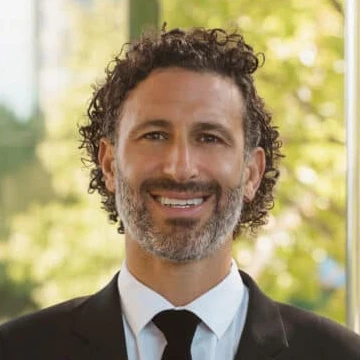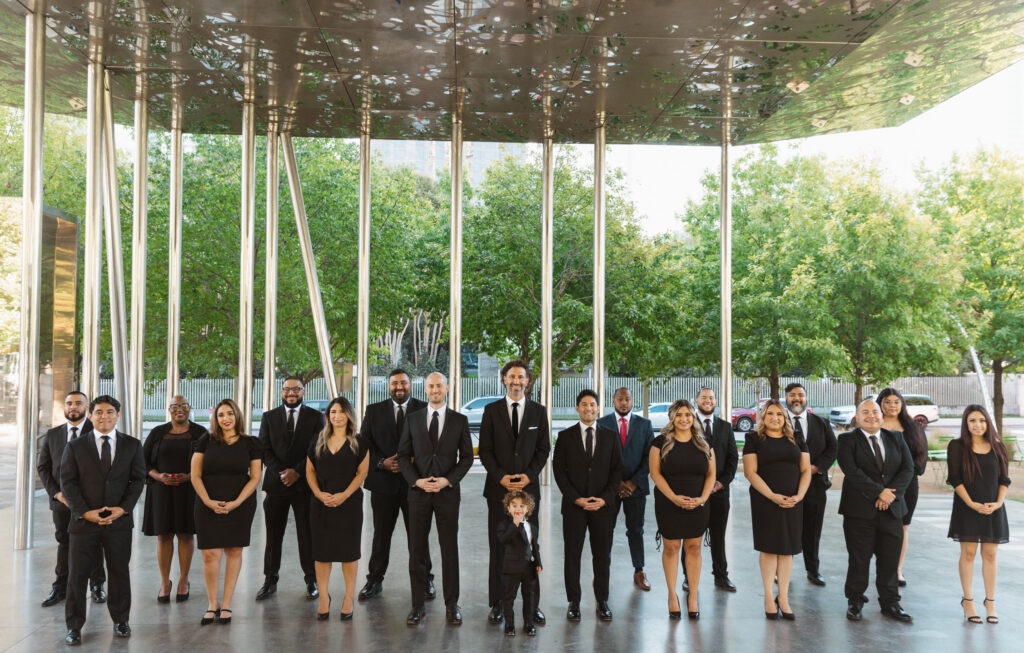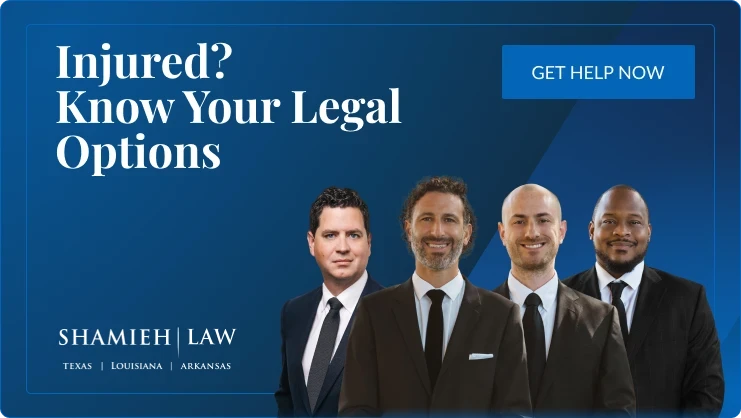Dallas Hit and Run Accident Lawyer
40+ Years
of Combined Experience
5.0 Google Rating
with over 800+ Reviews
Over $250M
Won for Clients That Have Become Family

Content Reviewed By:
Date Last Updated: January 9, 2026
A hit-and-run accident can be a deeply distressing experience. Knowing that someone injured you, your property, or a loved one and then fled to avoid responsibility is difficult to live through. Their actions can leave you with physical injuries and the burden of legal and financial uncertainties. A Dallas hit and run accident lawyer can help hold the liable driver accountable.
In 2022, Texans experienced one reportable crash every 57 seconds. Most of these accidents involved parties responsible enough to stay at the scene. However, sometimes liable parties flee, turning an accident into a potential felony and a nightmare for the victim.
Our trusted Dallas car accident lawyers at Shamieh Law can help you through this challenging time. We bring empathy, experience, and an impressive track record to the table. Our firm is made up of highly skilled personal injury attorneys who believe in taking a compassionate approach to legal representation. We tailor our strategies uniquely to the demands of your specific situation. We are committed to providing compassionate, high-quality legal counsel while helping you through the practical aftermath of a hit-and-run accident.
Why Work With Shamieh Law’s Hit and Run Accident Attorneys in Dallas
At Shamieh Law, we stand out by “Winning With Awareness.” We treat each client like a member of our family. Our empathetic approach puts your case in capable and caring hands. Here are some key reasons why partnering with one of the Dallas hit-and-run accident lawyers at Shamieh Law is a wise decision:
- Personalized attention – We understand that each case is unique. That’s one reason we take the time to understand your specific needs and challenges.
- Comprehensive support – We’re here to support you every step of the way. Whether that means obtaining medical attention or negotiating settlements, we treat every aspect of your case with the utmost care and attention it deserves.
- Effective communication – We believe in keeping you informed and involved throughout the legal process. Our lines of communication are always open. We take the time to educate you about your legal options and their ramifications, putting you in the driver’s seat.
- Proven track record – Our experience and dedication have led to significant settlements for our clients, demonstrating our ability to handle complex legal situations.
Case Results
Our team has a history of securing excellent settlements and verdicts that truly make a difference in our clients’ lives. Some notable examples include:
- $650,000 in a complex collision case – We secured a settlement in this challenging case. The defendant caused a three-car collision, resulting in a traumatic brain injury for our client.
- $600,000 for a rear-end collision – Our client received a generous settlement after a rear-end collision resulted in a cervical disc replacement surgery.
- $500,000 for a wrong-way crash involving a minor – This case involved a minor driving their parents’ car the wrong way. The minor caused a head-on collision and fled the scene.
- $450,000 from a commercial vehicle accident – A commercial vehicle failed to yield the right of way, causing an accident that led to our client needing spinal fusion.
- $375,000 in a rear-end collision leading to serious injuries – A rear-end collision caused our client to be knocked into the curb and off the road. Their injuries required multiple spinal injections and surgery recommendations.
When Is a Crash Considered a Hit and Run?
Legally, a hit-and-run accident occurs when a driver has an auto accident and leaves the scene. A typical hit-and-run scenario typically involves two crucial elements. First, the at-fault driver fails to share their contact and insurance details. Second, the driver fails to provide help to any injured parties. This is unethical and illegal in Texas. The law requires you to assist anyone injured in an accident you are involved in.
It’s important to understand that you have legal options and a right to seek compensation and justice for your injuries. Our experienced Dallas hit-and-run accident lawyers can guide you through the legal process.
Immediate Steps to Take Following a Hit and Run Accident in Dallas
Act swiftly following a hit and run accident. Take these steps to safeguard your interests:
- Check for injuries – Your health is the primary concern. Check yourself and others for injuries. If medical attention is needed, call 911 immediately.
- Document the scene – If it’s safe, document the scene. Photograph your vehicle, any damages, and the surrounding area. Note the time and location of the accident.
- Look for witnesses – If there are bystanders, ask for their contact information. Eyewitness accounts can be invaluable in a hit-and-run case.
- File a police report – Contact the police as soon as possible. A police report is crucial for legal and insurance purposes.
- Consult a Dallas hit-and-run injury lawyer – The experienced attorneys at Shamieh Law can guide you through your legal claim. We can help you gather evidence and work towards securing the compensation you deserve.
- Notify your insurance company – Inform your insurance provider about the accident. It’s important to consult with your lawyer before speaking with insurance companies.
Key Information to Collect After a Hit and Run
Collecting evidence is important after a hit-and-run accident. If there were witnesses or cameras, try to gather:
- Vehicle details – Ask if anyone knows or suspects the make, model, color, and any part of the license plate number of the fleeing vehicle. Even incomplete information can be helpful, such as whether the hit-and-run driver was in a car or a commercial truck.
- Accident details – Document the time, location, and circumstances of the accident. Consider factors such as the direction the other vehicle was heading.
- Photographic evidence – Take pictures or videos of the scene. Include street signs, traffic signals, and any debris left by the hit-and-run driver.
- Witness information – Witness testimonies can significantly strengthen your claim. Gather contact details of all witnesses.
- Police report – Once the police file their report, you or your lawyer can contact the police to obtain a copy.
Your hit-and-run accident attorney can help you gather evidence. However, certain opportunities to gather information only exist in the immediate aftermath of a hit-and-run accident.
Texas Laws on Hit-and-Run Accidents
Texas law is strict when it comes to hit-and-run accidents. Laws you should be aware of include:
- Legal obligation to stop – Texas law requires drivers involved in accidents causing injury, death, or property damage to stop, provide aid, and exchange information.
- Severity-based penalties – The penalties for a hit and run vary based on the accident’s severity.
- Class C misdemeanor – The damage to all vehicles is less than $200.
- Class B misdemeanor – The damage to all vehicles is more than $200.
- Second-degree felony – The accident resulted in death.
- Third-degree felony – The accident resulted in serious bodily injury.
- Statute of limitations – This state-specific law limits your time frame to take legal action. In Texas, you typically have two years from an accident date to file a lawsuit.
How Long After a Dallas Hit-and-Run Accident Can You Sue the Liable Party?
The statute of limitations determines how long a person can be charged for their role in an accident. According to Texas’s personal injury statute of limitations, you generally have two years from the date of injury to file a lawsuit.
It’s important for anyone involved in a hit-and-run accident to consult with an attorney as soon as possible. Our Dallas hit-and-run accident lawyer can make sure you know your legal rights and that your case is filed on time.
What Damages Can Victims of Dallas Hit and Run Accidents Recover?
Damages in a Dallas hit-and-run accident can be broken down into three categories: economic damages, noneconomic damages, and punitive damages.
Economic Damages
Economic damages are fairly simple to calculate. They include losses that come with a price tag, such as:
- Medical expenses – This includes costs for medical care, ongoing treatments, rehabilitation, and future medical needs.
- Lost wages and earning capacity – If the accident impairs your ability to work, you can claim compensation for lost wages and potential future earnings.
- Property damage – This includes compensation for repairs or replacement of your vehicle and other personal property damaged in the accident.
Non-economic Damages
Noneconomic damages are more challenging to quantify but no less serious. They compensate for things like:
- Pain and suffering
- Loss of enjoyment of life
- Disfigurement and physical impairment
- Emotional and psychological trauma
- Loss of consortium
While noneconomic damages are not easily quantifiable, an experienced personal injury lawyer who understands hit-and-run accidents can help you estimate their value. Courts usually determine these damages by considering the severity and permanence of your injury and its impact on your quality of life.
Punitive Damages
Punitive damages, or exemplary damages, play a unique role in Texas law. Courts do not intend these damages to compensate you for your losses. Rather, they award these damages to punish defendants and deter others from acting similarly.
The court awards punitive damages in cases where the defendant’s behavior was especially harmful or despicable. This includes willful, wanton, grossly negligent, or malicious conduct. Punitive damages are more likely when the claim involves significant injuries, damage, or wrongful death.
Punitive damages, while rare, can be a significant part of your damage awards. Though it’s impossible to predict whether a court will award punitive damages, a Dallas hit-and-run accident lawyer can evaluate your claim and estimate the total value of your case.
How Can An Attorney Help in a Dallas Hit and Run Accident Case?
Your Dallas hit-and-run accident lawyer can guide you through the legal complexities of your case. Specifically, they can help you by:
- Navigating Texas laws
- Conducting an investigation
- Dealing with insurance companies
- Providing top-notch legal counsel and representation

Contact a Hit and Run Lawyer at Shamieh Law Today
If you or a loved one has been involved in a hit-and-run accident in Dallas, it is important to secure high-quality legal representation. We understand the path to justice and compensation can be challenging. But you are not alone on this journey. Shamieh Law is here to help you through this difficult time. Among other things, we offer:
- Exceptional legal guidance
- Comprehensive support
- Free case reviews
- A no-win, no-fee guarantee
Ready to take the first step toward recovery and justice? Reach out to our Dallas personal injury law office. Schedule your free consultation by calling (469) 813-7332 or filling out our online contact form.
Dallas Hit and Run Accident FAQ
A hit and run accident can raise numerous questions. At Shamieh Law, we understand your concerns. Below are some answers to some of the most common questions we receive from our clients:
You should immediately call the police to file a report. For more information, visit the Dallas Police Department website to make a report. It is best to file your report as soon as possible, as the time frame varies depending on the details of your case. An experienced hit and run accident lawyer can verify the deadlines associated with your case.
If someone killed your loved one in a hit and run accident, you may have grounds for a wrongful death claim. Shamieh Law has outstanding lawyers experienced in both hit and run claims and wrongful death claims.
Insurance coverage for a hit and run accident depends on your policy. Uninsured motorist coverage can play a crucial role. Consult with a Dallas hit and run injury lawyer for case-specific advice.
There is no difference between leaving the scene and a hit and run. While leaving the scene of the accident may sound less harsh, it implies the same action. Not stopping after an auto accident involving property damage, death, or injury is a crime that can range from a misdemeanor to a felony.
